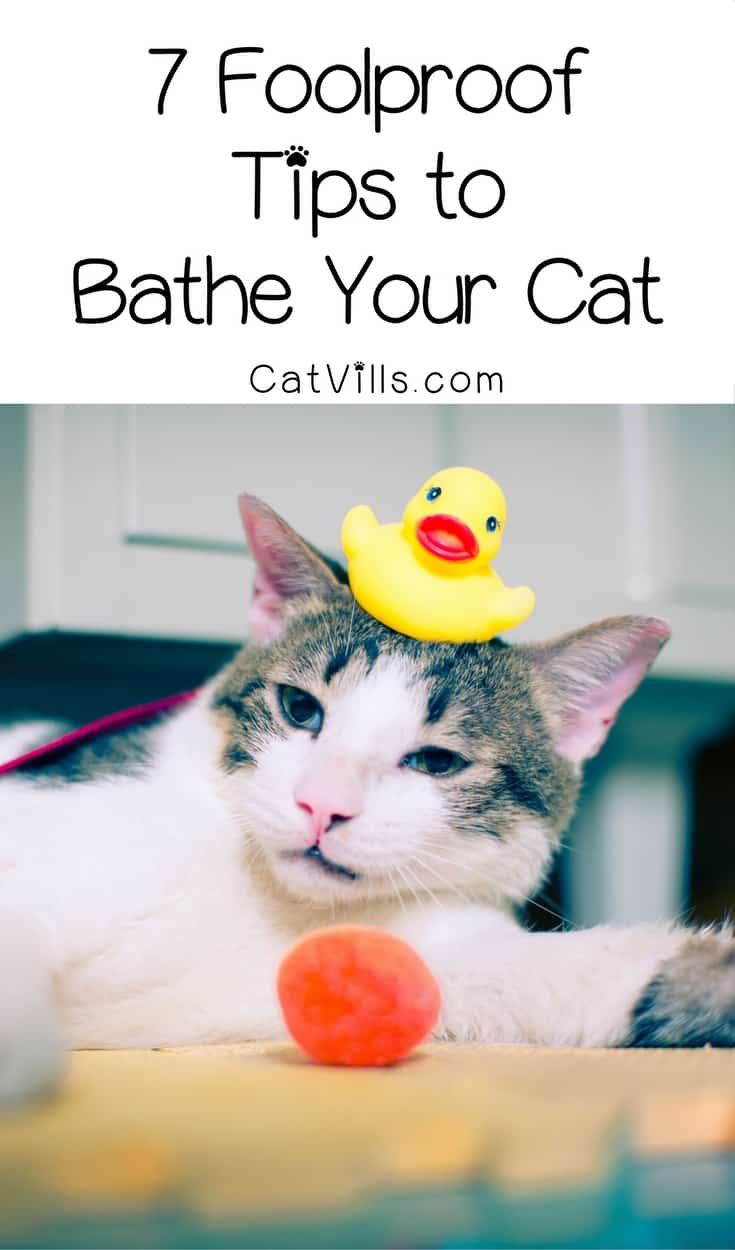Last Updated: 1 year ago
Looking for some foolproof tips to bathe your cat without ending up covered in scratches and bites?
We’ve got you covered with our seven tips on how to bathe a cat!
Below, we’re sharing some of our proven methods for getting the job done with a minimal amount of trauma for you or your cat.
We’ll also go over some special considerations for newborn kittens (namely, should you even bathe them at all?).
Foolproof Tips On How To Bathe A Cat
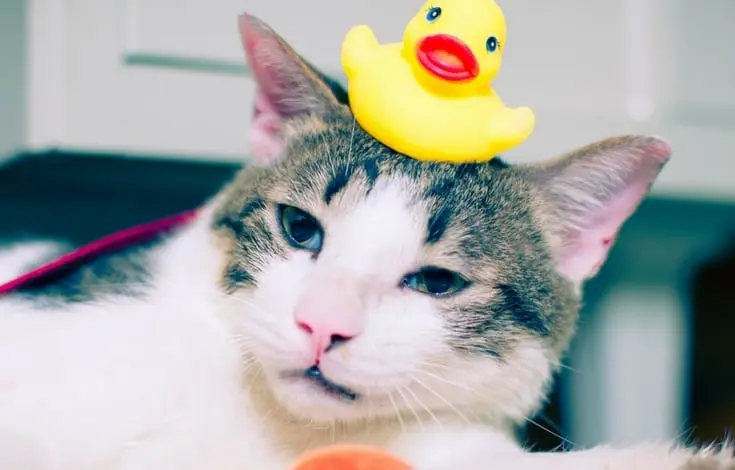
Ever try to bathe your cat? I have. When I was a kid, we had a cat named Buttons.
He was one of the sweetest cats I’ve ever met, but he turned into Linda Blair in The Exorcist the minute we tried to bathe him.
Have you ever seen a cat go berserk in an enclosed tub stall? It’s really something! My sister and I had to double-team it, and we both ended up with plenty of scratches.
Needless to say, we usually left Buttons to clean himself. Fortunately, it isn’t often necessary to bathe your cat, as most take their personal hygiene very seriously.
There are those times, though, when your cat has gotten into something he shouldn’t have or if she’s older and isn’t as neat as she used to be in the litter when you just have to bathe him or her.
Since many cats have an aversion to water, it may be easier said than done.
Follow these tips on how to bathe a cat and make the process as painless as possible for the both of you.
1. Sponge bathe when possible
Unless you’ve been bathing your cat since she was a kitten, she may be very uncomfortable with being submerged in water.
If it’s possible to just “spot clean” you’re better off going that route.
Close yourselves into a small room like the bathroom or utility room and hold her in your lap while you clean each area with a small cloth or sponge.
Make sure to rinse out the shampoo completely, as any residue could dry out your cat’s skin or cause an upset stomach when licking.
2. Use the right shampoo
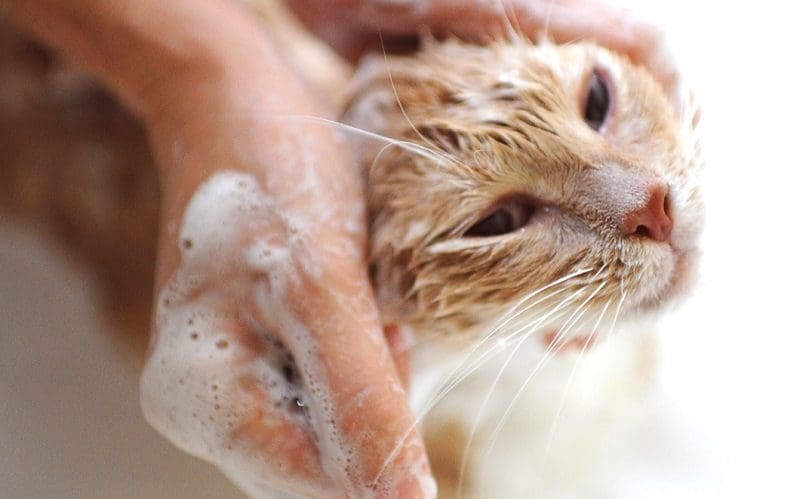
Cats are very sensitive to smells, and many of them have sensitive skin. Use a shampoo that is gentle and has a very mild scent.
I’ve used my own shampoo on my dogs before in a pinch, but that won’t do with your cat.
3. Use a collar and short leash
If you have to get your cat’s entire body wet, use a collar and a very short leash to hold him in place.
4. Get in the tub, too
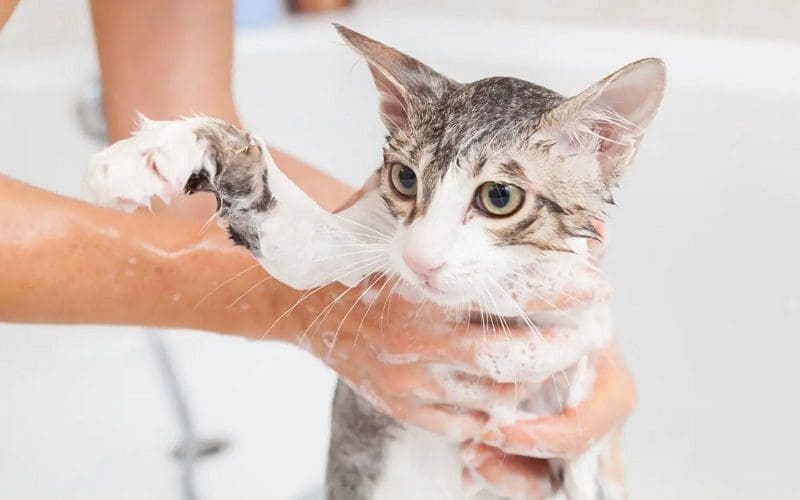
Your cat is probably going to be unhappy and uncomfortable with her bath, so climb in with her.
Hold her in your lap, pet her gently, and speak soothingly.
If you have a shower stall instead of a tub, consider using the kitchen sink instead.
5. Use the sprayer
Ideally, don’t fill the tub or sink basin. If you have a removable shower head or sprayer for your dishes, you won’t need to have your cat sit in a tub or sink full of water.
Think of how your hair stylist washes your hair—same idea.
6. Have plenty of towels ready to go
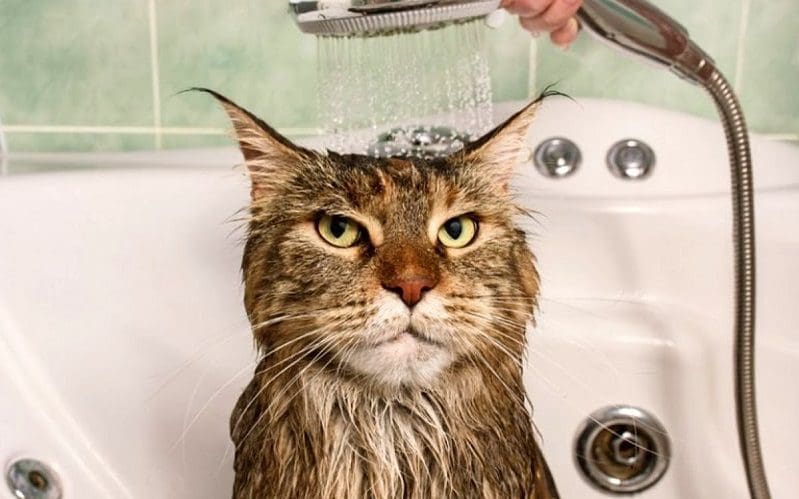
Your cat is going to be cold after his bath, so use a few towels to dry him. After the first one is saturated, move on to the next.
Continue this method until you have a mostly dry towel to wrap him in and cuddle him while he dries off and warms up.
7. When in doubt, enlist the professionals
If you’ve tried all of the above tips and you still cannot bathe your cat unscathed, you might be better off giving in and taking her to the groomer.
Hopefully, you’ll only need to bathe your cat occasionally.
These tips should help make the experience as positive for you both as possible.
Benefits of Bathing Your Cat
Regular bathing helps keep your cat’s fur clean, free from dirt and debris, and smelling fresh.
It also prevents skin infections that can occur when bacteria build up on their coat.
1. Cleanliness and Hygiene
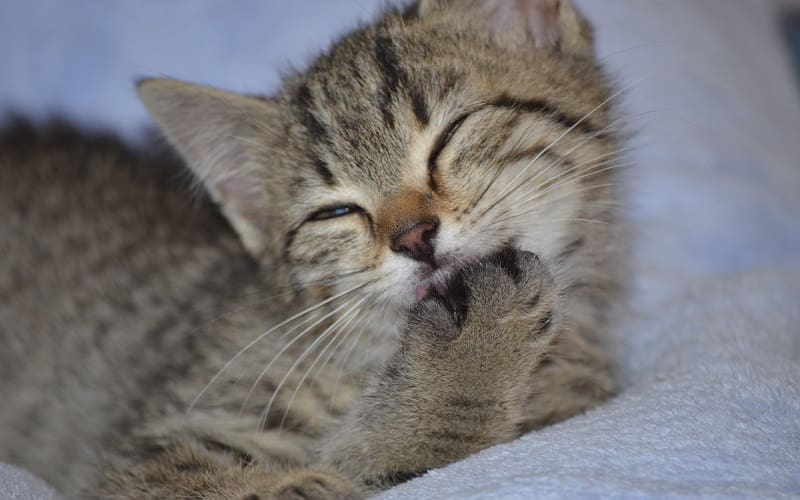
Regular baths are essential for cats to stay clean and free from dirt or debris that may accumulate in their fur over time.
This will help prevent the spread of bacteria or parasites that could cause illness.
Regular brushing between baths can help remove excess hair, which will reduce shedding around the house.
2. Skin and coat health
Bathing your cat regularly can also improve their skin health by removing any dead cells or dandruff that may have built up on their coat over time.
The warm water used during a bath can also open up pores, allowing oils to be released more easily, which keeps the skin hydrated while providing natural protection against environmental irritants like pollen or dust mites.
3. Stress Relief and Bonding Time
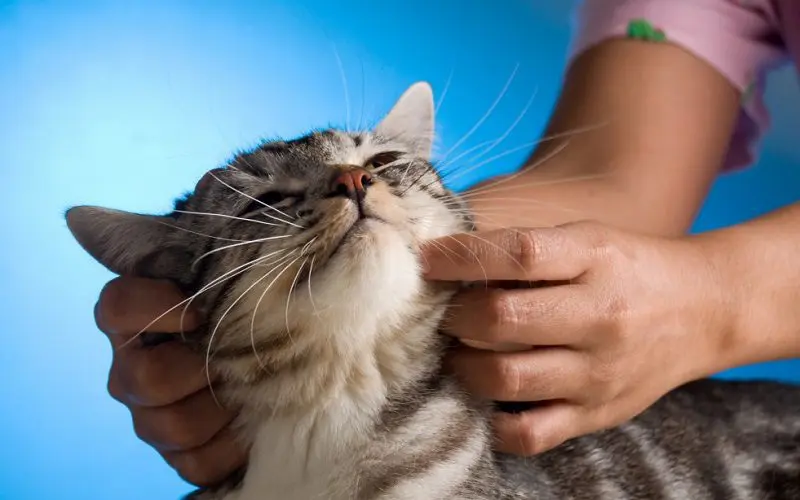
Taking some time out of your day to give your cat a bath is not only beneficial for them physically but mentally as well!
Not only does it provide much-needed relaxation for both you and your pet, but it’s also a great way to bond with each other through gentle massage-like strokes during the process—something cats really enjoy!
4. Flea Prevention and Treatment
If you live in an area where fleas are common, then bathing your cat regularly should be at the top of your list when it comes to preventive measures against infestations!
Fleas are attracted to dirty coats, so washing away any potential eggs before they hatch will go a long way towards keeping these pesky critters away from your furry friend!
If there is already an infestation, then using specialized shampoos designed specifically for this purpose should do wonders for getting rid of them quickly.
Should You Bathe Newborn Kittens?
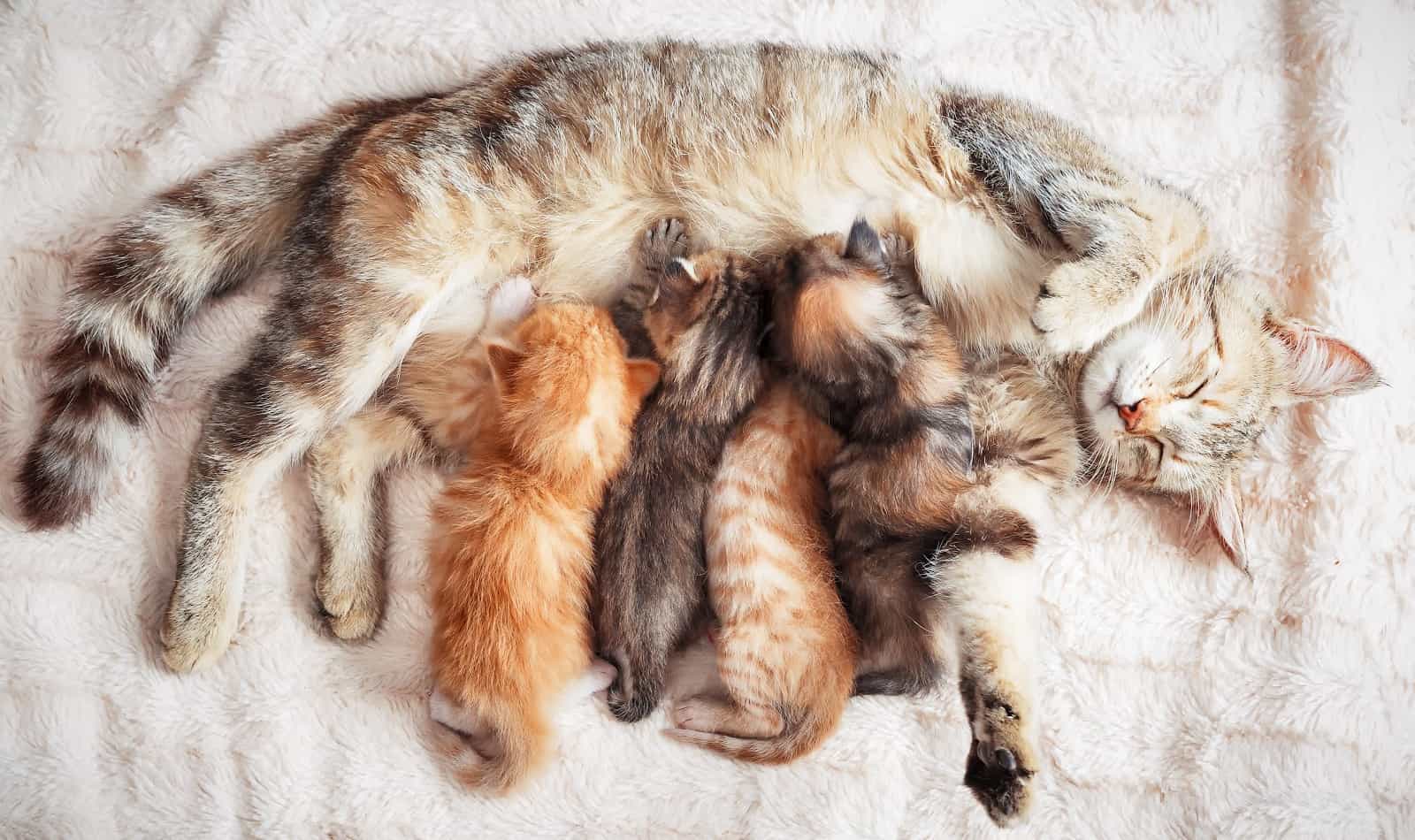
Bathing newborn kittens can be tempting for an owner new to the birthing and post-birthing process, but it’s not a good idea. In fact, it’s a very bad idea.
I came across a question in the forums from an owner asking if bathing newborn kittens was okay because her cat had just given birth.
The owner said there was blood, and the kittens were covered in afterbirth and the like.
This is actually quite normal, but to the uninitiated, it can look like something out of a horror movie.
In fact, I believe her specific words were, “There’s blood all over the blankets, and the kittens are covered in stuff. They’re crawling all through it.”
I could almost hear the worry in her voice as I read it, and I had to feel bad. Nothing at all was wrong, but she was obviously a bit freaked out by it.
Why Bathing Newborn Kittens is a Bad Idea
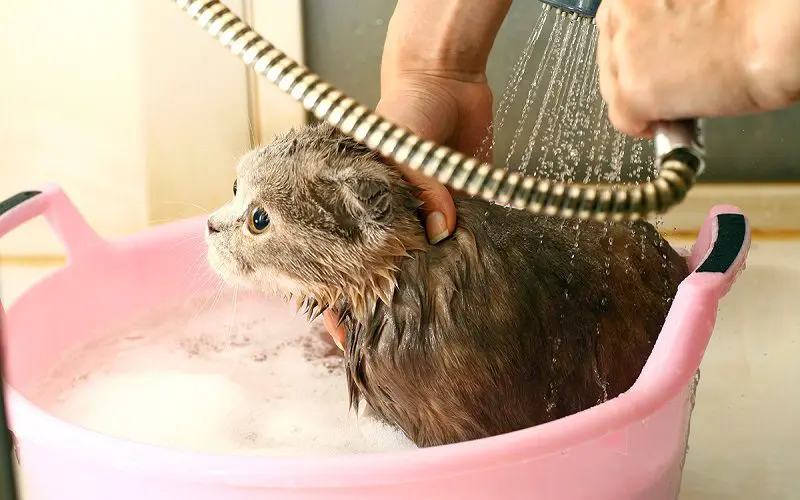
To begin with, there’s an entire physical and psychological process that goes along with birth and post birth.
All of the things that happen during and after birth are part of nature’s way of ensuring that mom and kittens bond immediately, so interrupting that process in any way is always a bad idea.
That being said, let’s look at the specifics.
Bonding
When a mother cat gives birth to her kittens, she will immediately being to eat the placenta and chew off the umbilical cords.
From there, she will lick her kittens completely clean.
While this may seem gross to us humans, it’s an important part of the bonding process, wherein mom gets to know the scent of her kittens and her kittens get to know hers as well.
Bathing newborn kittens interrupts that process and can cause the mom to reject them.
Sickness
Newborn kittens are unable to properly self-regulate their temperatures.
The short of it is that kittens need to be in that classic kitten pile and all snuggled up to mom to stay nice and toasty.
No matter how careful you are, bathing newborn kittens can, and most likely would, lead to them becoming chilled and possibly getting sick.
What to do Instead of Bathing Newborn Kittens
First and foremost, the best thing to do is not to do anything—at least in the beginning.
Let mom and the kittens do their whole get-to-know-you cleaning ritual and give mom a chance to rest and recover from the birth.
If she’s recovered but still hasn’t properly cleaned off the kittens, take a clean, dry cloth and gently rub down the kittens to get any excess birth fluid and/or blood off of them.
Do not bathe them or use any water.
After you finish the dry patdown, or if mom has already gotten the kids clean, gently change out the messy towels for new ones, making sure not to let the kittens catch a chill.
Then it’s just a matter of feeding mom high-calorie kitten food. She’ll be nursing quite a few hungry babies, and she’ll need all the calories that she can get.
FAQs
How Often Should You Bathe a Cat?
Most cats don’t need frequent baths, as they groom themselves daily. However, some situations may require bathing, such as getting into something dirty or having a skin condition. The general rule of thumb is to bathe your cat no more than once every 4 to 6 weeks, unless advised otherwise by your vet.
Can You Wash a Cat?
Yes, you can wash a cat, but it’s important to use cat-specific shampoos and ensure a gentle approach to avoid stressing the cat.
Can You Bathe a Cat With Dawn?
Dawn dish soap is not recommended for bathing cats as it can be harsh on their skin and strip away essential oils, leading to dryness and irritation. It’s best to use shampoos specifically formulated for cats.
Wrap-Up
And there you have it. Bathing newborn kittens on your own is always a bad idea and should never be done.
In fact, the entire birthing process is actually quite easy for owners if we do what we should, which is just shy of nothing.
Mother nature got it right without us, so all we really need to do is change out the bedding and make sure mom eats high-quality food. That’s it!
If, and that’s a big if, there’s a legit reason to do it, it’s best to let your vet handle it.
